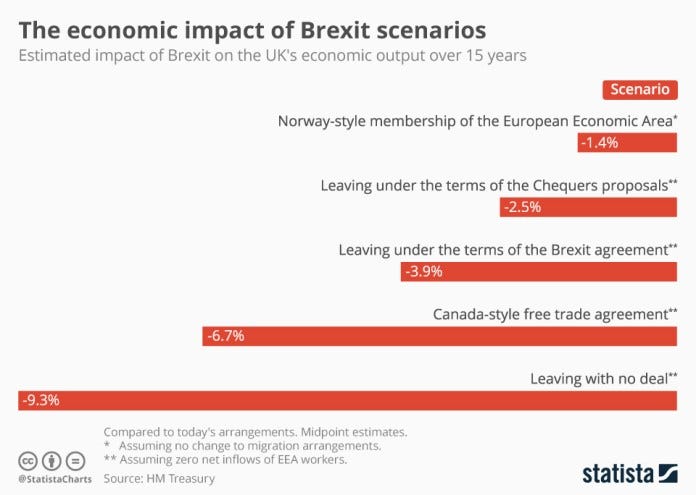The never-ending saga of Brexit now has a new deadline – Oct. 31, 2019 by which the Brits have to decide whether they want to exit with or without a deal from the EU. Brexit is the latest of the 9 Black Swan Events in the Financial World that I wrote about in January. One of the biggest economic partnerships that has turned into a messy divorce with a resolution not in sight. It has been a rocky relationship since the signing of the Maastricht Treaty in 1992, which turned the countries of Europe into a single monetary union — this involved huge transfers of power to the new European Union. Britain opted out from the single currency and the social chapter. Britain finally subscribed to the social chapter in 1997 but decided to maintain their own currency — a decision that some say was right one considering the Euro’s woes for the past few years.
EU tried to solve their economic problems via a new treaty which the UK ended up vetoing after demanding exemptions in 2011. As a knee jerk reaction to the Brexit vote in 2016, the global markets fell sharply with the Pound & Euro both declining significantly as well. Gold, which acts as a traditional hedge against risk rose 6%. The transition plan negotiated between the British PM & EU was recently voted down in the UK Parliament multiple times taking things back to square one. Not only this but it cost the Pro-Brexit UK Prime Minister Theresa her job, it has been left to the incoming PM to solve what has become a complex riddle.
While the International markets have been rocked recently with an on-going trade war between the U.S & China, the problems have been compounded even further in the Euro Zone where the manufacturing activity has dropped to its lowest level since 2012. Italy is suffering from its fifth recession in two decades while the biggest economy in EU – Germany – barely avoided recession last year with a flat growth rate. ECB (European Central Bank) has recently announced that it is ready to add monetary stimulus, should the weakness persist. But why should a slowdown in EU worry the UK? Well, EU is still the UK’s biggest trading partner with more than half of the Kingdom’s exports ending there. It is inevitable, therefore, that bad news for the EU will be bad news for the UK – that’s just the reality of the trade relationships in the World economy.
The first infographic above outlines economic output scenarios for the UK economy over a 15-year time horizon, depending on which route it eventually takes to sever the relationship with the EU bloc. These long term scenarios have a lot of variables which can change the picture for better or worse. Looking at the second infographic (below), which presents the economic data out of the UK since the Brexit referendum in 2016 presents a mixed picture.
On the bright side, UK unemployment has fallen to its lowest level since 1975 & wages have grown, which in turn has reduced government borrowing & increased tax revenues. UK’s stock exchange FTSE 100 has recovered significantly from the lows of 2016, but still remains below the levels reached in June 2018. Business activity has also rebounded from 2016 contraction of below 50, but it is just holding above 50 (expansion), far below the 54-56 levels seen in 2017-18. Retail sales have been swinging up & down, but have been making higher lows showing some sort of resilience in the domestic demand.
On the downside, the trade has been beginning to slide after the initial recovery from Brexit vote. The international trade friction between U.S-China could be a big contributor to this headline number apart from the global economic slowdown. House price growth across the UK has slowed down to the lowest level in 8 years amid fear of a crash in property value in the wake of Brexit. And the biggest weakness seen yet is in the national currency of Pound Sterling which saw a drop of 15% against the USD and 18% against EUR after the Brexit vote. The rebound to 1.4300 level in GBPUSD proved short-lived as it is currently trading around the 1.2700 handle down almost 18% from the pre-Brexit levels.
There is a case to be made for both pro-Brexiters & pro-Bloc voters. Which way will the dust settle?
Email ?| Twitter ? | LinkedIn ?| StockTwits ? | Telegram ?



